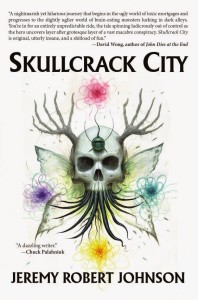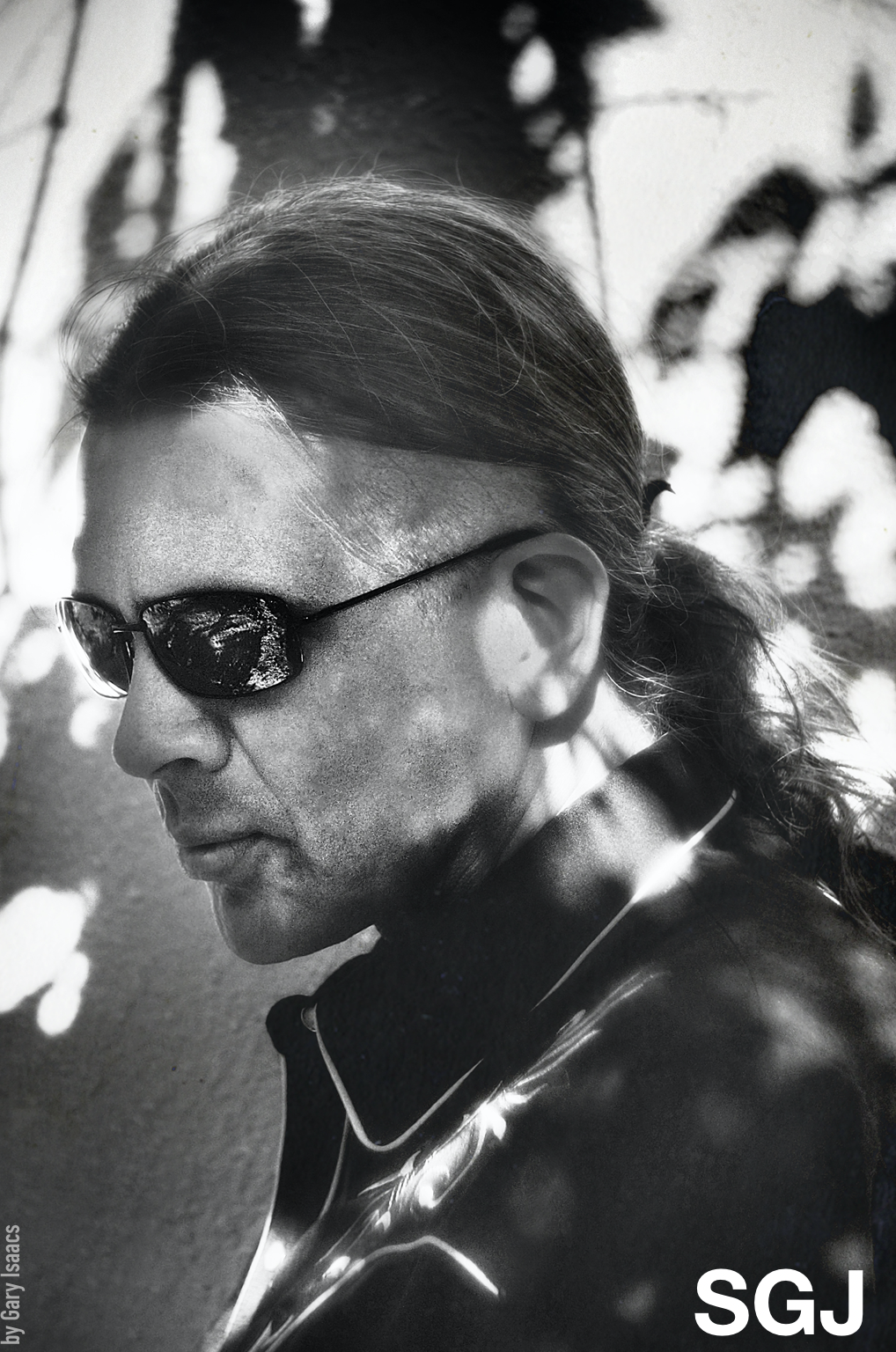 Because I kind of insist on assigning amazing stuff for my grad workshops, I of course assigned Jeremy Robert Johnson’s Skullcrack City (my original write-up here). It was dug by all. Here’s JRJ’s answers to the questions we crowd-sourced:
Because I kind of insist on assigning amazing stuff for my grad workshops, I of course assigned Jeremy Robert Johnson’s Skullcrack City (my original write-up here). It was dug by all. Here’s JRJ’s answers to the questions we crowd-sourced:
—To start with the ending: Is this bleak or is it hopeful? Are they (that is, ‘we’) winning? What others ending were under consideration, if any, or did you have this as your get-to point the whole time?
This was always my ending, for years, and I earnestly believed that it would be hopeful and beautiful and offer a respite from all the craziness which came before it. Then I started writing it and suddenly realized the true implications of that path for humanity and I got really creeped out. I think the ambiguity there fluctuates in direct response to the reader’s level of misanthropy.
So, yes: humanity “survives” the Vakhtang scourge and the known universe isn’t sucked over into an even-more-terrible realm, but now there’s this sort of shape-shifting-nanovirus/grey flood-collective consciousness thing floating from world to world, and despite its gathered wisdom it is still asserting its right to exist by consuming or altering that which comes before it.
So if you like the idea of some vestige of humanity extending into infinity throughout time and space: Hopeful.
But if you think about what might happen to the worlds this thing encounters: Creepy.
(Side note: Part of the reason this ending always existed was that I wanted to pay homage to the transmissions in Carpenter’s Prince of Darkness. There’s a lot of Prince of Darkness’ “anything goes” metaphysics and weird science in the book.)
—The Hex/Bank/Delta Med/Dr. T/Reality television/Occult all being layered and tied together, how did this come about? Any two or three of them would have made a story tick, but all of them coming together makes this novel all the more intense. Was it difficult making these all work together, or did it happen naturally?
Basically, somewhere around the end of writing the first act, I lost my mind and decided that corporate criminals and brain-eating monsters and drug addiction wouldn’t quite give me the level of propulsion I wanted for the story. I didn’t know what the key was, though, and I was driving in my truck, drinking a coffee and from out of nowhere it hit me and I pulled over and got out a post-it note and wrote down, “wolf gods/psychic vampires/underground army” and there you go.
Don’t know I’d ever go this dense again. Mapping everything took three spreadsheets and the continuity was a real grind.
—While bizarro draws from horror and science fiction and weird fiction and mystery and more, this may be the first one to do all that and draw so greedily from the thriller. Intentional? Any thriller-models you were keeping in mind?
I’ve always been honest about this: I was a drug-store-spinning-paperback-rack reader all the way until I got to college and found a good stash of literary books (and then I had to act stuffy for a while during my self-serious twenties). But the books I read as a kid infect all my work, and I went through all the Robin Cook and Michael Crichton thrillers (full disclosure: there were even a few Grishams in the mix) and I was totally hooked on Robert Ludlum. So there’s a lot of the Ludlum and Crichton templates in the mix. Maybe a pinch of Smilla’s Sense of Snow, in that I tried to use the language as something other than utilitarian plot-forwarding.
The other big thriller influence would be Ellroy’s The Big Nowhere. I borrowed that book from a guy in a writer’s workshop and he left his bookmark in there and it was completely covered in notes—characters, motivations, crimes committed, character links to each other. And when I started reading the book I realized that the notes were helpful because the story’s convolutions were crazy and Ellroy trusted the reader to parse it all out. The momentum and the twists in the book were just insane, and the faster you read it and got hooked into the narrator the more it all clicked together, and I admired the hell out of that and wanted to try my hand at that kind of story.
—That ‘many voices one head’-chapter feels like one you came at it forty-two times, trying to find the right way to do it. Yes, no? What other formatting devices did you consider and reject? Like, say, the black boxes around S.P.’s thoughts when confronting Dr. T, they’re completely effective. But, did you fall into that immediately, or did it take some trial and error?
So much trial and error. Altered justification, varying fonts (for each voice—yeesh), italics, all caps, all of the above. It was a formatting nightmare.
I settled on italics with spacing and the brief spate of boxes for that central conflict. In the end, only Henry Trasp got a special font. The rest I realized I’d have to define via voice and contextual clues (or my publisher was going to kill me).
—How was it to write/create the Dr. T character, especially knowing what the Japanese did in real life during WW2. Did you ever get nervous that you were stepping on toes, or crossing a line?
Harlan Ellison regarding the controversy over the computer game adaptation of “I Have No Mouth, and I Must Scream”: “Apparently some stores will not carry this game because they’re afraid it may offend someone, to which my response is ‘Who? Nazis?’ We had someone say, ‘This trivializes the Holocaust.’ I got really pissed about that. In this age of skinheads and morons who believe the Holocaust was all made up on a Hollywood soundstage, there’s nothing that can trivialize the Holocaust. Put the Holocaust on cocktail napkins! Put it on Tampax ads! Put it on television every fifteen minutes! The only way you can trivialize the Holocaust is to forget it — and this game refuses to let you forget it.”
I read that interview when I was young and it had a big influence on my view of exploitation. I’ve always thought that so long as you paint horrible truth as exactly that, you’ve given the subject enough gravity.
That chapter was pretty excruciating to write, especially since I’d done loads of research into the actual atrocities and found them massively unsettling. In the first draft of the book Tikoshi’s chapter was 9,000 words longer. I wanted to create something akin to the end of Chinatown, which is to say, the kind of noir in which the long-sought truth can produce only pain and regret. So the original version actually had a lot more about Dr. T’s experiences in WWII and his later experiments creating the skullcrackers, but the end result was just too much of a punishing shift into pitch-black territory.
—Have you ever had a pet turtle? We’re asking this from a never-having-had-a-pet-turtle place.
I had a yellow-bellied slider named Torta. He loved to hunt goldfish and take sunlamp naps. He passed from a liver illness after many years of being awesome. As far as companions go, I’d rank turtles well above fish and most other reptiles.
—Why Portland? Would this story have changed significantly were it set in LA, or Boston?
The unnamed city in Skullcrack is actually an amalgam—lots of Portland in there, with a little NY, Boston, Chicago, and LA in the mix. If Portland is predominate that’s because I know my town’s particular blend of crime and poverty better.
I specifically kept real cities and real firearms out of the novel because those are the two things people will unreasonably obsess about if you make an error, and I didn’t want something like a misstated cross-street knocking anybody off the ride.
—Say this gets adapted to the screen. Would you prefer live action or animation? If animation, what style? What would it go on the shelf with? Who’d be your dream director for it?
Live action, directed by Shane Carruth or Jonathan Glazer because I deeply admire their films and they’d elevate an adaptation beyond the story.
If it was shelved, somehow, by The Big Lebowski, Chinatown, Blade Runner, After Hours, Upstream Color, Sexy Beast, Mulholland Drive, Phantasm, Cronenberg’s The Fly, and Prince of Darkness, then that would be pretty cool.
—As a first-time novelist, what advice would you give to others currently writing or conceptualizing their first novel? How is the novel different from the short story, for you? What did you learn from writing this one that you’ll take into your next novel?
My answer to both the first and third questions: Do not write densely layered conspiracy thrillers. I’m not joking. Go for a lean, character-based story that isn’t so beholden to the machinations of plot. Save yourself that particular stress.
Also: Don’t write a novel about a sensitive young man coming-of-age in rough-and-tumble New York, because we have enough of those books. It’s tempting, I know, because sometimes NY pays a lot of money for that, and some critic will inevitably say you’ve written a tour-de-force, but I feel like we can at least move that story to other cities.
Also: Good luck! Writing a novel is a lonely endeavor, but also intermittently beautiful and well worth it.
For the second question: I felt it was radically different from short story writing. The rise and fall had to be more carefully modulated, experimentation felt more dangerous given the length of the project, and you’re trying to hit so many notes rather than just playing a single note perfectly and to great effect. I love writing in both forms, but I missed the kind of mania that can come from sitting down and typing right through to the end as you can often do with the first draft of a short. There’s more time in a novel to doubt, and to get lost.
—What did you leave on the cutting room floor this time? If you could director’s-cut Skullcrack City, what would be re-included?
Well, there was the aforementioned extended version of “Den of Cannibals” chapter, but I stand behind all 9,000 of those cuts.
There used to be a more gonzo version of the Prologue where you meet Deckard’s consciousness and he yells something like, “I SAID ‘FISH,’ MOTHERFUCKER!”
That got cut. Made me laugh, but it was just too soon and too confounding.
If I ever did a director’s version I’d actually try to go White Jazz on the thing and cut another 6,000 words. And maybe I’d find a place to add that Deckard thing back in.

 is the NYT bestselling author of 30 or so books, +350 stories, some comic books, and all this stuff here. He lives in Boulder, Colorado, and has a few broken-down old trucks, one PhD, and way too many boots. More
is the NYT bestselling author of 30 or so books, +350 stories, some comic books, and all this stuff here. He lives in Boulder, Colorado, and has a few broken-down old trucks, one PhD, and way too many boots. More